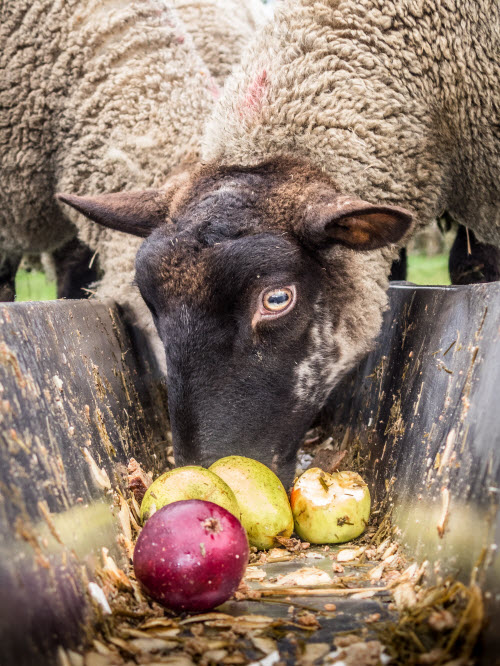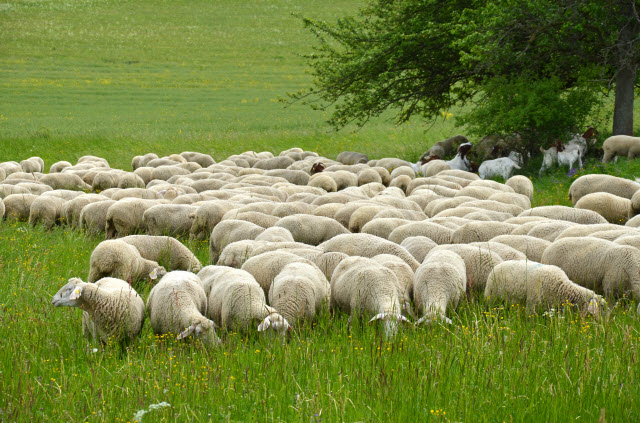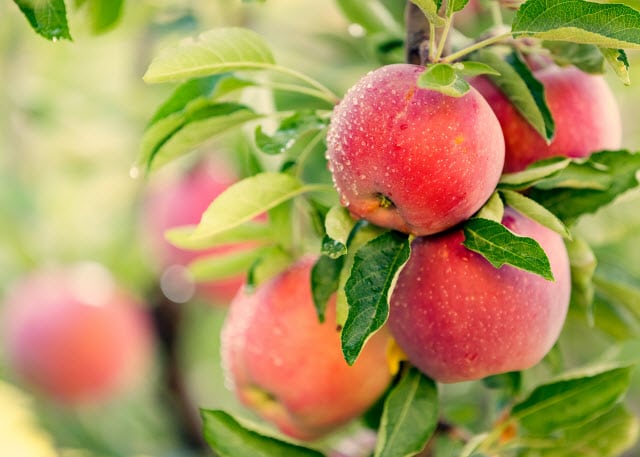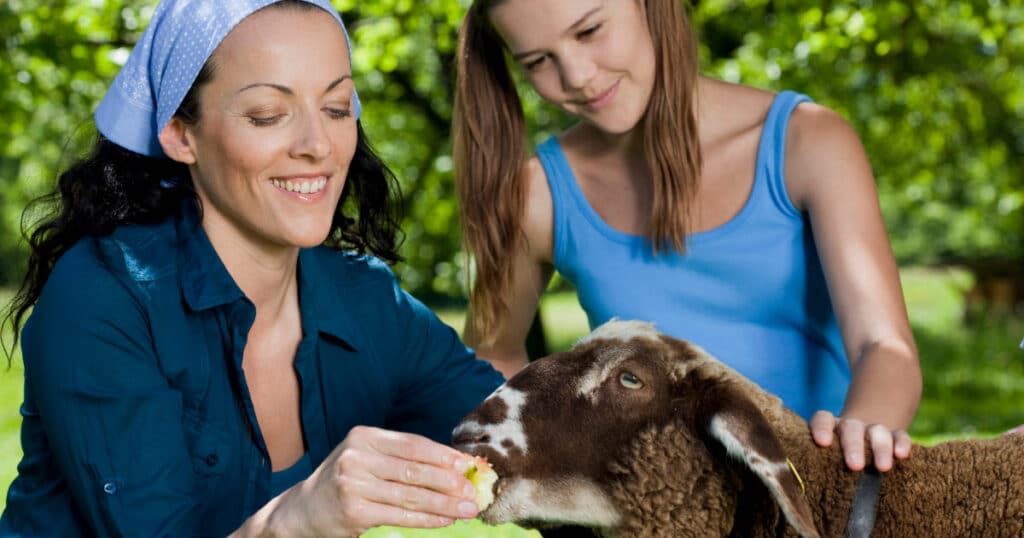Can sheep eat apples or will apples and/or apple seeds harm a sheep or make them sick? Do you need to be concerned about sheep in pastures with apple trees?
In this article, we’ll go over whether apples make good treats for sheep. We’ll cover the nutrition requirements of the animal to maintain overall health and well-being.
So, Can Sheep Eat Apples? (short answer)
While sheep are ruminants and they graze for their food, they can eat apples in very small amounts. In fact, they can eat other fruits and vegetables, as well. The key is portion control and understanding how each food can affect them.
If you let your sheep eat apples, you must cut them into tiny pieces beforehand. You cannot let the animals eat apple seeds, as they can be poisonous. This fact combined with the fact that sheep should not eat too much apple means that you should never let sheep eat apples from trees in an orchard. If you have an orchard or some apple trees, this is something that you will have to keep in mind when deciding where to keep your sheep.
How Small Amounts of Apple Can Benefit Sheep
While you must be careful not to give your sheep too much apple, a little bit of apple can be a good addition to the sheep’s diet. Apple skin has fiber and potassium, and there are many vitamins and nutrients in apple that can benefit your sheep.

If you decide to give any apple to your sheep, ensure there are no apple seeds included. As mentioned earlier, the seeds can be poisonous for the animals. Any apple should be given to your sheep in tiny pieces in the middle of the day. Giving it to them at this time of day will help prevent their normal grazing being interfered with in any way.
Remember to cut the apple into tiny pieces or crush it before feeding it to your sheep. This will help prevent your animals choking on the fruit. Always go through the apple carefully beforehand, removing any seeds. If your sheep have never had apples before, you will need to introduce them to it in a gradual way.
Always keep the quantity of apple that you give your sheep small, as too much of this acidic fruit can lead to health problems. Excessive consumption of acidic fruit can lead to gasses being trapped in the gastrointestinal gasses. There can be blockages that can be extremely painful for the animal. Bowel disturbances can also be involved.
Sheep can suffer from Acidosis when they eat an excessive amount of sugar, such as the sugar that is found in apples. This condition can be quite dangerous and may even lead to death in some cases.
Sheep Nutritional Needs
As sheep are grazers, green grasses and various kinds of grain are the crucial components of their diet. Sheep need pasture, and they tend to graze as long as a minimum of eight or nine hours each and every day. This is if they are also being given sheep feed. If they aren’t getting an adequate supply of sheep feed, they will graze for even longer periods of time.

Sheep must also always have access to clean and fresh water. Each animal needs to drink approximately four liters of water a day. If circumstances are in any way unusual or extreme, they may need more water than this.
The space of pasture that your sheep will need usually depends on the land quality, as well as the types of forage available on it, how the pasture is managed, and rainfall distribution and amounts. When there isn’t enough fresh pasture grazing and forage for your sheep, you will need to more fully supplement their diets with foods such as harvested or stored feeds, silage, hay, green chop, or crop by-products. Fruits can also play a part in supplementing the sheep diet, as long as they are not fed in excessive quantities.
Always consult with a veterinarian before deciding on the specifics of your sheep’s diets and the ways that you supplement it to ensure all their nutritional needs are met. Sheep that are very young or old or that are in poor condition may need extra supplementation. If any of your sheep have dental problems or experience problems with eating for other reasons, ask your vet about what needs to be done.
Nutrients in Apples
Apples offer a great variety of nutrients, including vitamins and minerals. Some of these include:

- Potassium: Apples are rich in potassium and it is necessary for the maintenance of your sheep’s electrolyte balance. Potassium is also the primary mineral found in the fluid within sheep cells. It is needed for cell buoyancy. This mineral is also essential for bacterial fermentation that occurs in the rumen. It is also believed that potassium plays some part in facilitating magnesium and calcium absorption in sheep.
- Vitamin C: Vitamin C supports immunity in sheep. It can also be effective in preventing the development of hepatic lesions. It can also help prevent the more serious effects of heat stress and other kinds of stress. Vitamin C also helps to fight the effects of toxins.
- Vitamin A: Vitamin A is essential for correct development of sheep. It also improves immunity, growth, fertility, night vision, and how the epithelial tissue functions.
- Magnesium: Sheep have to get enough magnesium in their diet to maintain optimal feeding habits. It also helps with milk production and lambing, and it’s key in helping the animal deal with stress.
Apples also offer a great deal of fiber in their peels. A lot of the fiber found in apples is in the form of pectin.
Make Sure Your Sheep Get the Proper Nutrition
As we have seen here, sheep owners and farmers need to be fully informed about sheep nutrition. Make sure to ask a veterinarian for detailed guidance and advice. If you want to give your sheep apples, you must take precautions and ensure no seeds are included.

